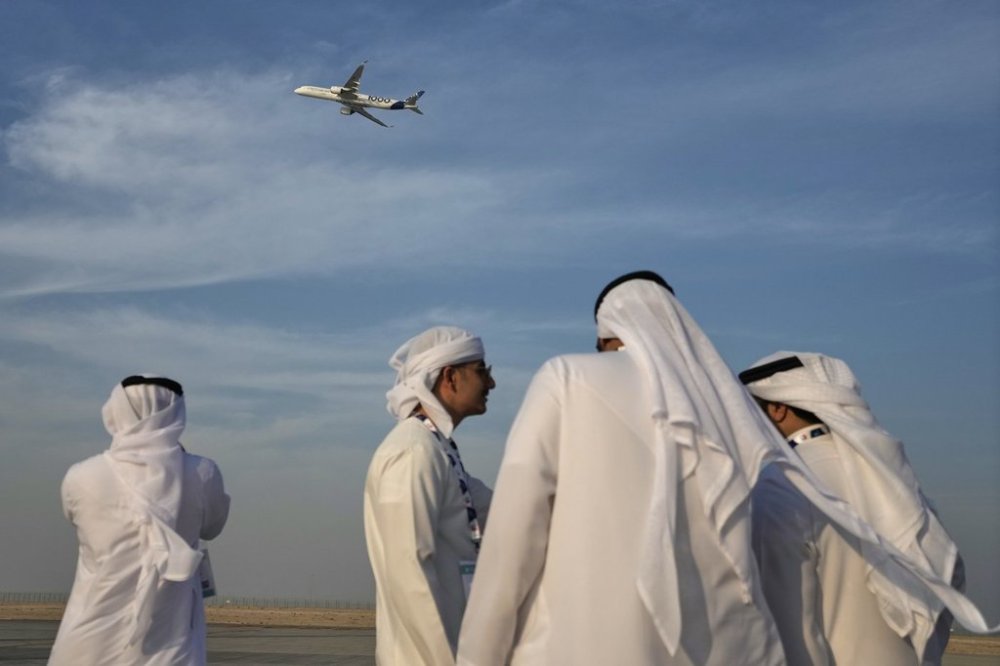World
Etihad Expands Fleet with Order for 16 Airbus Aircraft

Abu Dhabi’s Etihad Airways has placed an order for 16 Airbus aircraft, marking a significant step in its expansion strategy as the airline’s financial performance improves. The announcement was made during the Dubai Air Show, and the order includes six A330-900s, seven A350-1000s, and three A350F freighters. The financial details of the deal were not disclosed, as airlines typically negotiate lower prices for large orders.
The order comes on the heels of a remarkable financial turnaround for Etihad, which reported a profit of $476 million in 2024. While this figure is modest compared to rival Emirates’ record profit of $5.2 billion in the same period, it illustrates a significant recovery from previous losses. Since its inception in 2003, Etihad has faced challenges in competing with the larger Emirates, which operates a more extensive fleet and global network.
Financial Recovery and Competitive Landscape
Etihad’s recent financial performance is a welcome change after a tumultuous period. The airline has incurred losses of approximately $6 billion since 2016, largely due to aggressive investments in international airlines aimed at enhancing its competitive position against Emirates and Qatar Airways.
The airline’s strategy involves not only expanding its fleet but also revitalizing its operational model. Despite earlier struggles with its business plan, the recent order signals confidence in a sustainable growth trajectory, aided by the recovery of global travel demand.
In a move that further highlights the competitive rivalry in the aviation sector, Emirates announced an order for 65 Boeing 777-9 aircraft on the same day, valued at approximately $38 billion at list prices. Tim Clark, President of Emirates, acknowledged the delays Boeing has faced in delivering the 777-9 but expressed optimism that the significant order would prompt expedited progress from the manufacturer.
Future Expansion Plans for Dubai
The aviation sector in the region is poised for further growth with ambitious infrastructure projects. The expansion of Al Maktoum International Airport at Dubai World Central is set to be a game-changer, with a projected investment of $35 billion. The airport aims to accommodate five parallel runways and 400 aircraft gates, significantly enhancing its capacity over the next decade.
Clark emphasized that the expansion would enable Emirates and its budget counterpart, FlyDubai, to broaden their route networks. “We’ll be able to reach any point on the planet,” he stated, reflecting the airline’s commitment to global connectivity as new aircraft join its fleet.
As the aviation industry continues to recover, Etihad’s order for Airbus aircraft and Emirates’ substantial investment in Boeing underline the competitive dynamics and growth potential within the region. The coming years are likely to see an intensified focus on fleet modernization and expanded service offerings as both airlines position themselves for future success.
-

 Science3 months ago
Science3 months agoToyoake City Proposes Daily Two-Hour Smartphone Use Limit
-

 Top Stories3 months ago
Top Stories3 months agoPedestrian Fatally Injured in Esquimalt Collision on August 14
-

 Health3 months ago
Health3 months agoB.C. Review Reveals Urgent Need for Rare-Disease Drug Reforms
-

 Technology3 months ago
Technology3 months agoDark Adventure Game “Bye Sweet Carole” Set for October Release
-

 World3 months ago
World3 months agoJimmy Lai’s Defense Challenges Charges Under National Security Law
-

 Lifestyle3 months ago
Lifestyle3 months agoVictoria’s Pop-Up Shop Shines Light on B.C.’s Wolf Cull
-

 Technology3 months ago
Technology3 months agoKonami Revives Iconic Metal Gear Solid Delta Ahead of Release
-

 Technology3 months ago
Technology3 months agoApple Expands Self-Service Repair Program to Canada
-

 Technology3 months ago
Technology3 months agoSnapmaker U1 Color 3D Printer Redefines Speed and Sustainability
-

 Technology3 months ago
Technology3 months agoAION Folding Knife: Redefining EDC Design with Premium Materials
-

 Business3 months ago
Business3 months agoGordon Murray Automotive Unveils S1 LM and Le Mans GTR at Monterey
-

 Technology3 months ago
Technology3 months agoSolve Today’s Wordle Challenge: Hints and Answer for August 19









